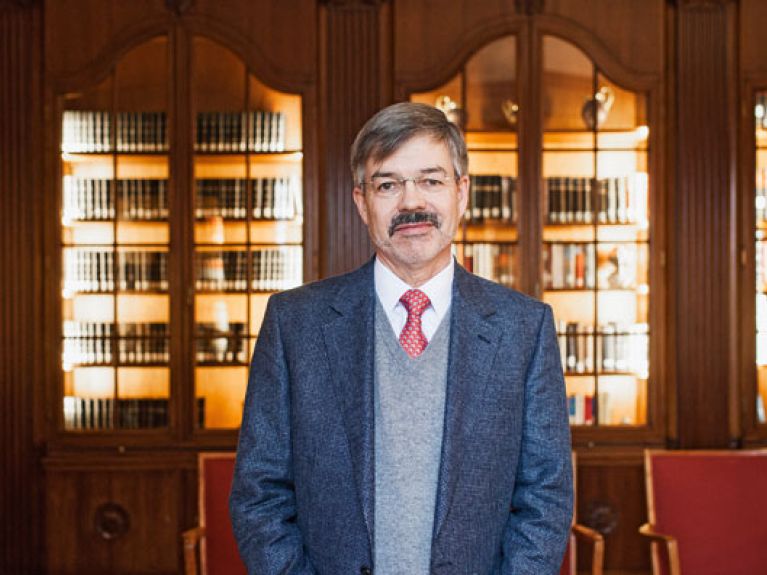Ambassador Dr Hans Carl von Werthern in Japan
German ambassadors and senior German employees in international organizations present insights into their work in the deutschland.de series “Foreign posting”. Part 20: Dr Hans Carl von Werthern in Japan.

Mr Ambassador, Japan is following Germany and will be hosting the G7 summit in May 2016. Which main issues will be on the agenda, and which goals do the two countries have in common?
Japan and Germany are working hand in hand within the G7 framework. When Japan took over the presidency it also adopted most of the key issues. The main focus will be on the community of values and responsibilities for freedom, democracy and human rights. Germany and Japan are working together with the other G7 partners towards a value and rule-based global economic system in which growth, employment and the entrepreneurial independence of women are strengthened. The fight against terrorism and the containment of climate change are also on the list, as well as faster and more effective responses to epidemics. Among the many other topics on the agenda I should perhaps mention maritime safety. So Germany and Japan are addressing the major challenges of our time together. The Group of Seven summit in May 2016, with ten ministerial and innumerable preliminary meetings, provides an excellent forum for an exchange of views, cooperation and decision-making.
One key area is always economics. But the free trade agreement between the EU and Japan has still not been completed. What are the reasons for this?
In German we say: a good thing is worth waiting for. Trade issues are equally complex for both the EU and Japan. That’s why thorough negotiations are needed. The European Union is anxious to conclude an agreement with Japan that is pioneering and ambitious in substance. The result is very important. We are very pleased that Prime Minister Abe has said he would like to reach a speedy conclusion. The European Union is already one of Japan’s large trading partners and accounts for ten per cent of the country’s trade volume. With its 500 million citizens the EU represents 24 per cent of global gross domestic product and offers an attractive market especially for Japanese enterprises. Consequently, the free trade agreement will contribute towards economic growth, the creation of new jobs and the strengthening of competitiveness between companies in both markets.
Japan and Germany emphasize different aspects in economic policy. Japan accentuates robotics and Germany supports industry 4.0. Are these two different routes, or two sides of the same coin?
It might even be one side of the same coin! It’s true that both Germany and Japan are major industrial nations with similar industrial cultures. Both countries are aiming to prepare their enterprises for the next industrial revolution. We all know it will be a digital one. While our basic situations are similar, you could say that our approaches are ‘culture specific’. What makes Germany’s ‘Plattform Industrie 4.0’ so powerful is the strong partnership between the economic sphere, science and the government. We look for impulses from research in order to develop new business concepts from them. And a stable regulatory framework gives all participants legal certainty and thus investment security for the enterprises. I would say the key technological fields are robotics, sensors, innovative production systems and of course logistics. So let’s pool the resources and engineering know-how of both countries to set new global standards.
March 2016 marked the fifth anniversary of Japan’s triple catastrophe. How has Fukushima changed Japan?
The catastrophe of 2011 shocked everyone in Germany and resulted in a huge willingness to help the people of Japan. The after effects can still be felt. I have had many conversations with Japanese friends and colleagues, and I can definitely say that the catastrophe had a profound effect on public awareness. Since then faith in the security of nuclear technology has been utterly shaken. I welcome the introduction of strict inspection rules for the operation of nuclear power stations in Japan. And it is certainly a sign of trust and confidence that a German company has received the assignment to carry out studies on how to remove the heavily radioactive fuel rods. As in the field of nuclear power, this is also an illustration of our partnership in areas where we have very divergent views.
In 2004-2005 you headed the taskforce for Germany in Japan 2005/2006. What changes have there been in bilateral relations since then?
Our aim with the German Year in Japan, which began eleven years ago, was to promote aspects of Germany that were not yet so well known in Japan. We wanted to show that Germany has far more to offer than the clichés of Beethoven, beer and bratwurst, of industriousness, diligence and efficiency. For instance, lifestyle, quality of life, a lively pop culture, hi-tech and lots more. We raised awareness about Germany not only as a worthwhile travel destination, but also as an attractive place to study and pursue research. I think we have done quite well so far, even though an assignment like this is always an ongoing process. Today, more than ever before, Germany and Japan see each other as like-minded, reliable partners who work well together and learn a great deal from each other at all levels in an increasingly networked world. This cooperation is taking place at many levels: between civil societies, through university partnerships and cultural exchanges, between local authorities and regions, bilaterally at government level and, of course, multilaterally in frameworks such as the G7.

